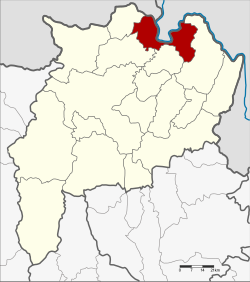Amphoe Chiang Saen
|
Chiang Saen เชียงแสน |
|
|---|---|
| Amphoe | |

The Golden Triangle in Amphoe Chiang Saen
|
|
 Amphoe location in Chiang Rai Province |
|
| Coordinates: 20°16′30″N 100°5′18″E / 20.27500°N 100.08833°ECoordinates: 20°16′30″N 100°5′18″E / 20.27500°N 100.08833°E | |
| Country | Thailand |
| Province | Chiang Rai |
| Seat | Wiang |
| Area | |
| • Total | 554.0 km2 (213.9 sq mi) |
| Population (2015) | |
| • Total | 53,500 |
| • Density | 99.2/km2 (257/sq mi) |
| Time zone | ICT (UTC+7) |
| Postal code | 57150 |
| Geocode | 5708 |
Chiang Saen (Thai: เชียงแสน; IPA: [tɕʰīaŋ sɛ̌ːn]) is a district (amphoe) in the northern part of Chiang Rai Province, northern Thailand. Chiang Saen is an important entrepôt for Thailand's trade with other countries on the upper part of Mekong River.
The Chiang Saen District is to be the site of the world's tallest flagpole when it is completed in 2017. The pole, to be 189 m tall, the equivalent of a 63-storey building, will take 15 months to complete at a cost of from 250 million baht to two billion baht. The originator of the project, Mr Trin Nilprasert, aims to promote "Thainess" and Thai identity. The flagpole is to be set in a park complete with a museum and a learning centre.
According to an ancient chronicle, the original city of Chiang Saen (Chiang: "offshoot", saen: "100,000") was built in 545 CE in an area called Yonok by Tai migrants from the Chinese province of Yunnan, and was an important city (Southeast Asia Mandala-model mueang) of the Lanna ("million paddies") Kingdom. No reliable written history of the city exists until the arrival of King Mengrai in the 13th century. His grandson, Saen Phu, ruler of the Lanna Kingdom, founded Chiang Saen in 1325 or 1328.
The city was sacked by Chao Kawila of Chiangmai during the reign of Rama I, because it had been the Burmese base of operations in the preceding years. The city was deserted, while its inhabitants resettled in other Bangkok-allied Lanna cities such as Lampang and Chiang Mai. Several ancient ruins are found in the old cities. For example, Wat Pa Sak hosts a well-preserved Lanna-style "phrathat".
...
Wikipedia
